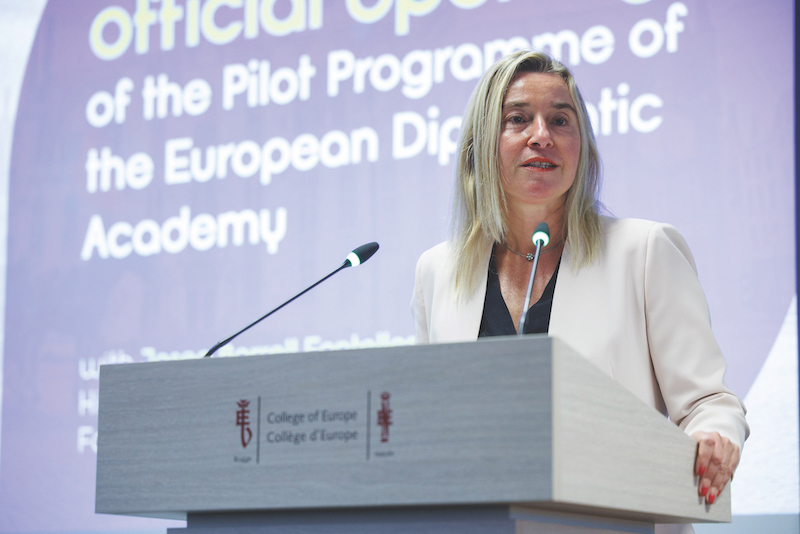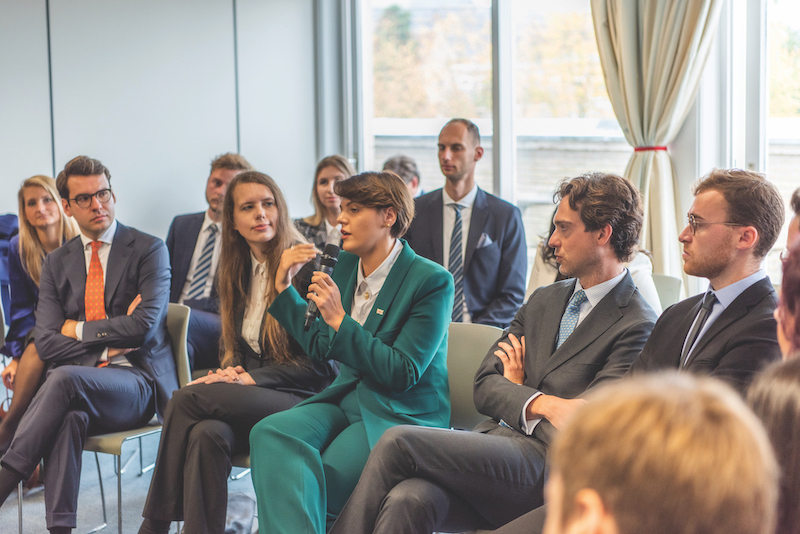There are some words and acronyms you simply cannot avoid if you live and work in the Brussels bubble, so you learn to embrace and accept them as essential to the Belgian existence, a little like the rain, or the waffle smell enveloping Grand Place.
Besides CAST, which stands for Contracts Agents Selection Tool and refers to the test that opens the gates for contract work at the European Union, the other major Brussels buzzword is College of Europe. Today the College of Europe is to the EU what Hogwarts is to the wizarding world.
The postgraduate institute of European studies was founded in 1949 by leading European political figures such as Paul-Henri Spaak, the first President of the European Coal and Steel Community, and Alcide De Gasperi, the storied Italian Prime Minister and active campaigner for European unity, to promote a spirit of solidarity and mutual understanding among western European states and to train people to uphold these values.
The similarity between this mission and that of the European Diplomatic Academy, a new project recently launched by the European External Action Service (EEAS), is striking.
Taking Spaak’s and De Gasperi’s vision one step further and creating a “truly European diplomatic corps”, the EEAS invited EU Member States as well as candidate countries to send diplomats who have served less than five years in their national systems to be trained on EU foreign and security policies as part of the first cohort of the Academy. The programme’s first iteration was open to officials from EU institutions as well.
The pilot project, initially authored and championed by MEP Nacho Sánchez Amor (S&D, ES), was submitted through the Committee on Foreign Affairs in April 2021 and ultimately granted €1m by the European Parliament in mid-November 2021.
“The idea of a new European diplomacy, formed by the single perspective of only representing the EU, arrives at a good time as the EU’s foreign policy is mature enough to count with its own and autonomous instruments,” says Amor.
“The idea of a new European diplomacy, formed by the single perspective of only representing the EU, arrives at a good time”
The College of Europe won the tender to run the project in June, and the Academy opened its doors on 29 August 2022. Some believe the hasty implementation is the reason France decided not to send any diplomats to Bruges.
It also meant that little information was available beforehand, making the application a leap of faith for some (each ministry oversees its own selection process). Sima from Finland reveals that at the time of her expression of interest, there weren’t many details about the project besides rumours that it might be run in Florence.
The 40 diplomats in the first cohort are gathered around a table in the warmly lit dining hall, eating lunch together in between training sessions and talking about their experience in the pilot project.
“Having high-ranking EU officials come speak to us and basically say ‘you are next’ is truly something,” says Thomas from Malta. “But I think we will only be able to really see the power of this experience later on.”
As the topic of the esprit de corps comes up at the table, he explains that Malta hosts a similar academy for the Mediterranean region, the Mediterranean Academy of Diplomatic Studies (MEDAC).
“Diplomats from all over the Mediterranean come to train and study together, and that experience is so intense that even years later alumni keep meeting up all around the world. This is doubtlessly going to be the same,” he says before joking with Sima about inevitably recognising each other in the corridors of Brussels later down the line.
Listening to Thomas, one would infer the diplomats have already been trained on StratCom (strategic communication) and LTTs (lines to take) because his words very strongly echo those of Federica Mogherini, the former High Representative for Foreign Affairs of the European Union and the director of the European Diplomatic Academy (as well as the current rector of the College of Europe).
 Federica Mogherini, rector of the College of Europe, speaks at the launch of the Academy in Bruges | Photo courtesy of the European Diplomatic Academy
Federica Mogherini, rector of the College of Europe, speaks at the launch of the Academy in Bruges | Photo courtesy of the European Diplomatic Academy
“Just imagine the power of having hundreds of junior diplomats coming from completely different backgrounds going through the same training year after year, sharing the same experiences, creating a network of contacts that will stay,” says the former Italian Foreign Minister.
The fact that the Academy is a nine-month residential programme helps the participants to create strong bonds. Such close contact offers a unique opportunity for the young diplomats to see how their counterparts from other countries perceive them and their national interests.
If the project continues, Mogherini voices the intention to establish an alums network similar to the College of Europe alums community, which is well-represented in the EEAS and other EU institutions. (For those who are unfamiliar with Brussels, any problem, question or qualm you may have about navigating EU bureaucracy, the golden rule is to ask a College of Europe alumnus.)
“I personally believe this could represent the first step towards a common sense of belonging to the European Diplomatic Service,” Mogherini says. “It could constitute sort of an evolution-revolution.”
The project is undoubtedly revolutionary in at least one aspect: the participation of diplomats from candidate countries. According to an EU spokesperson, the current geopolitical context has reminded the bloc of the importance of wider regional cooperation. “It is evident that global crises cannot be managed alone. [The Academy] has been an opportunity for candidate countries to have a sense of what being part of the EU family means, also in terms of a common diplomatic culture and background, in order to be more effective on the global scene,” the spokesperson says.
While the inclusion of diplomats from candidate countries is perhaps one of the project’s biggest strengths, it brings its own set of challenges. “For the candidate countries’ national diplomats, the specific focus is on accession, which sometimes translates into having parallel tracks of trainings, which in turn adds complexity to the course planning,” Mogherini explains.
Antonina from Ukraine breaks down how, when the cohort goes to Brussels later in the week to follow the work of the institutions, there are some activities the nationals of candidate countries won’t be able to partake in due to clearance issues, such as preparations for the Foreign Affairs Council. This protocol makes sense to her. What’s important, she stresses, is that the inclusion of candidate countries is a crucial aspect of the programme and should be retained in any future iterations.
Mogherini is on the same page. “The political message of targeting candidate countries is extremely important, but the forms of doing that may differ,” she says, adding that the College of Europe is open to different projects depending on the needs and desires of the EEAS. “After all, the purpose of a pilot project is to test the waters and see what works,” she notes.
 Participants of the European Diplomatic Academy ask questions at an event | Photo courtesy of the European Diplomatic Academy
Participants of the European Diplomatic Academy ask questions at an event | Photo courtesy of the European Diplomatic Academy
The College appears very attentive to what does and does not work, at least based on the junior diplomats’ comments. “We receive feedback forms for every session on Fridays and hold regular debriefing sessions. It’s great because we have both the capacity to modify the experience for ourselves and to shape it for the next cohort,” explains Sima.
To Kyriaki, from Cyprus, one of the best things about the programme is the exposure to professionals and practitioners who can share personal stories about their experience in EU foreign policy – they tell it how it is.
“I also think a highlight of the programme was starting out by taking a trip to the EU’s external borders,” Kyriaki adds, referring to the group’s two-week stay at the College’s Natolin campus, from which they travelled to the Polish border with Ukraine and Belarus.
After lunch, the participants attend a training session on EU-Nato relations. If there were any concerns in the foreign ministries of Member States that the Academy might blind diplomats to national interests, the exchanges that follow the lecture put them to rest, while also reinforcing the notion that European diplomacy is continually evolving.
To rector Mogherini, the goal of the Academy is very clearly “to build a network of people committed, trained along the same lines and aware of the difference between national and European diplomacy”, which she describes as “a completely different exercise”. But wearing these two hats at the same time is anything but easy, as any observer of Council politics knows well.
Diplomats won't fail to recognise their national capitals once they graduate from the Academy. Instead, they'll be going home with greater insight into navigating the Brussels bubble, where they will almost surely run into members of their cohort over the years. After all, everyone knows that true diplomacy is done over coffee.
Sign up to The Parliament's weekly newsletter
Every Friday our editorial team goes behind the headlines to offer insight and analysis on the key stories driving the EU agenda. Subscribe for free here.